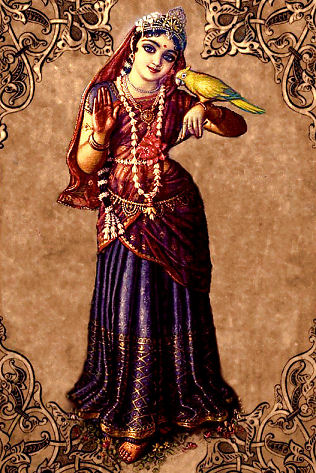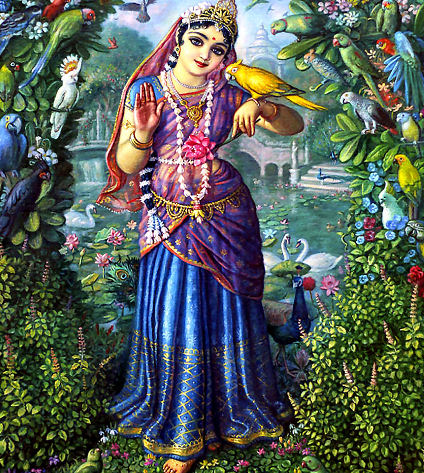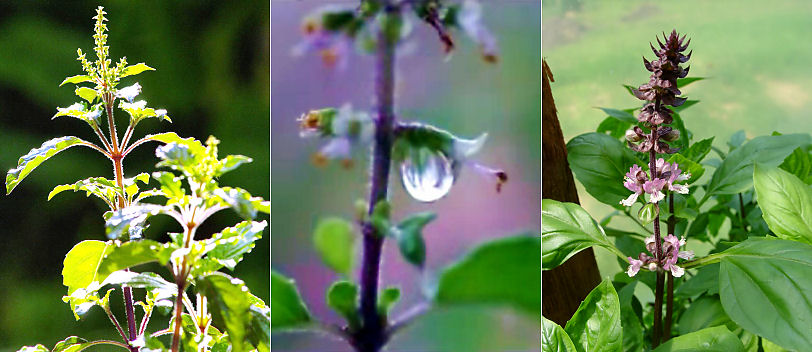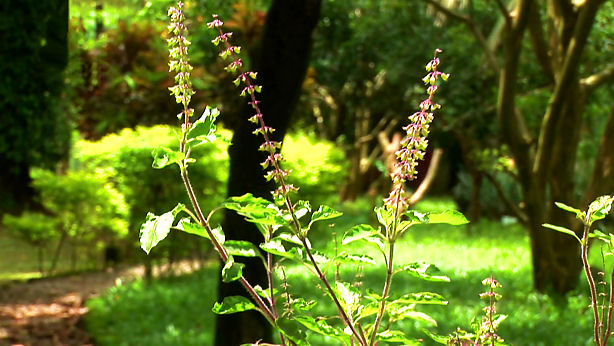- Śrīmatī Vṛndā Devī - - Śrīmatī Vṛndā Devī -
Aṣṭa-nāma-stava from the Padma Purāṇa
The Eight Names of Vṛndā-devī
Vṛndā Devī, Vṛndāvanī, Viśvapūjitā, Viśvapāvanī,
Puṣpasāra, Nandinī, Tulasī Devī, Kṛṣṇa-jīvanī
- Vṛndā Devī - She has thousand and thousands of sakhīs (associate maidservants).
- Vṛndāvanī - She never leaves Vṛndāvana.
- Viśvapūjitā - The whole universe worships her.
- Viśvapāvanī - She is the sanctifier of the whole world.
- Puṣpasāra - She is the essence of all flowers.
- Nandinī - She gives happiness to everyone.
- Tulasī Devī - She has an incomparable form.
- Kṛṣṇa-jīvanī - She is the life and soul of Lord Kṛṣṇa.
Anyone while worshiping Tulasī-devī chants these eight names will get the same results as one who performs the Aśvamedha sacrifice. And one who on the full-moon day of Kartika (Tulasī-devī's appearance day) worships Her with this Mantra will break free from the bonds of this miserable world of birth and death, and very quickly attains Goloka-Vṛndāvan. On the full moon-day of Kartik Lord Śrī Kṛṣṇa Himself worships Śrīmati Tulasī-devī with this Mantra.
"One who remembers this Mantra will very quickly attain devotion to Lord Kṛṣṇa's Transcendental Lotus Feet."
tulasy amṛta-janmāsi / sadā tvaṁ keśava-priyā
keśavārthaṁ cinomi tvāṁ varadā bhava śobhane
"O Tulasī of effulgent beauty, you were born from nectar, during the churning of the milk ocean. You are always very dear to Lord Keśava. Now, in order to worship Lord Keśava, I am collecting your leaves and mañjarīs. Please bestow your benediction on me that my worship will obtain success."
Another name of Tulasī is Vṛndā-devī (one who awards residence in Vṛndāvana). Vṛndā-devī is a pure devotee of Lord
Kṛṣṇa and an expansion of Śrīmatī Rādhārāṇī. She is responsible for setting up the wonderful pastimes of Śrī Rādhā and
Kṛṣṇa in Vṛndāvana. She exists as Tulasī to benefit the fallen conditioned souls by bestowing devotional service to Kṛṣṇa.
The 12 Forest of Vṛndāvana
ye tomāra śaraṇa loy, tara vāñchā pūrṇa hoy
kṛpā kori’ koro tāre vṛndāvana-vāsi
"Whoever takes shelter of you, all his desires are fulfilled
and by your mercy he becomes a resident of Vṛndāvana."
Kṛṣṇa's attractive features are also described by Vṛndā, the gopī after whom Vṛndāvana was named. (NoD 26)
Srila Narottama dasa Thakura says:kṛpā kori' koro tāre vṛndāvana-vāsi, “Dear Tulasī, please bestow your mercy upon me, so that I may forever reside in Vṛndāvana.”
Vṛndā-vana
"The word 'vana' means "forest." Vṛndāvana is the name given to the forest where Śrīmatī Vṛndādevī (Tulasīdevī) grows profusely."
Actually it is not a forest as we ordinarily consider a forest because it is very thick with green vegetation. There are twelve such vanas in Vṛndāvana. Some are located on the western side of the Yamunā and others on the eastern side. The forests situated on the eastern side are Bhadravana, Bilvavana, Lauhavana, Bhāṇḍīravana and Mahāvana. On the western side are Madhuvana, Tālavana, Kumudavana, Bahulāvana, Kāmyavana, Khadiravana and Vṛndāvana. These are the twelve forests of the Vṛndāvana area. (CC Madhya 17.193p.)
The five forests situated on the eastern side of the river Yamunā are Bhadra, Bilva, Loha, Bhāṇḍīra and Mahāvana. The seven forests situated on the western side of the Yamunā are Madhu, Tāla, Kumuda, Bahulā, Kāmya, Khadira and Vṛndāvana. After visiting all these forests, these pilgrims went to a place known as Pañcakrośī Vṛndāvana. Out of the twelve forests, the Vṛndāvana forest extends from the town of Vṛndāvana up to Nanda-grāma and Varṣāṇa, a distance of thirty-two miles, within which the Pañcakrośī Vṛndāvana town is situated. (CC Madhya 5.12 p.)
"My dear boy, I therefore wish all good fortune for you. You should go to the bank of the Yamunā, where there is a virtuous forest named Madhuvana, and there be purified. Just by going there, one draws nearer to the Supreme Personality of Godhead, who always lives there".
There are twelve forests in the area of Vṛndāvana, and Madhuvana is one of them. Pilgrims from all parts of India assemble together and visit all twelve of these forests. (SB 4.8.42 p.)
| There are five forests on the eastern bank of the Yamunā: 1) Bhadravana, 2) Bilvavana, 3) Lauhavana, 4) Bhāṇḍīravana 5) Mahāvana. |
On the western side
of the bank there are seven: 6.) Madhuvana, 7.) Tālavana, 8.) Kumudavana, 9.) Bahulāvana, 10.) Kāmyavana, 11.) Khadiravana 12.) Vṛndāvana. |
ln those twelve forests there are different ghāṭas, or bathing places. They are listed as follows:
| (1) Avimukta, (2) Adhirūḍha, (3) Guhya-tīrtha, (4) Prayāga-tīrtha, (5) Kanakhala, (6) Tinduka-tīrtha, (7) Sūrya-tīrtha, (8) Vaṭasvāmī, (9) Dhruva-ghāṭa (Dhruva-ghāṭa, where there are many nice trees of fruits and flowers, is famous because Dhruva Mahārāja meditated and underwent severe penances and austerities there in an elevated spot) (10) Ṛṣi-tīrtha, (11) Mokṣa-tīrtha, |
(12) Budha-tīrtha, (13) Gokarṇa, (14) Kṛṣṇagaṅgā, (15) Vaikuṇṭha, (16) Asi-kuṇḍa, (17) Catuḥ-sāmudrika-kūpa, (18) Akrūra-tīrtha (when Kṛṣṇa and Balarāma were going to Mathurā in the chariot driven by Akrūra, all of them took baths in this ghāṭa), (19) Yājñika-vipra-sthāna, (20) Kubjā-kūpa, (21) Raṅga-sthala, (22) Mañcha-sthala, (23) Mallayuddha-sthāna, (24) Daśāśvamedha. |



